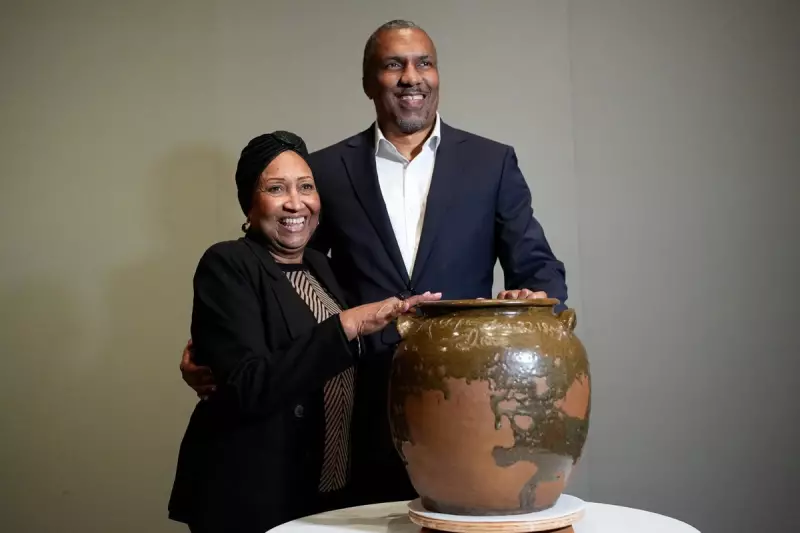
Historic Restitution for Enslaved Potter's Family
In an unprecedented move that experts are calling the first major art restitution case involving works by an enslaved person in the United States, descendants of David Drake - known as "Dave the Potter" - have reclaimed two rare stoneware jars he created in South Carolina before the Civil War.
The landmark agreement between Drake's family and the Museum of Fine Arts in Boston represents a significant moment in addressing historical injustices in the art world, traditionally dominated by restitution cases involving Nazi-looted artworks from World War II.
A Spiritual Connection Across Centuries
For 86-year-old Daisy Whitner, a Washington D.C. resident and retired account manager for The Washington Post, touching one of the jars in the Boston museum gallery became an emotional bridge to her ancestor. "I was telling the kids, 'Inside this jar, I'm sure I'm feeling his tears, sweat drops off his face, his arms,'" Whitner recalled of the moment her fingertips detected a slight rise in the clay inside the vessel's wide mouth.
The returned jars are among hundreds of surviving works by Dave the Potter, who laboured in the alkaline-glazed stoneware potteries of Edgefield, South Carolina during the decades before and throughout the Civil War. What makes his work extraordinary is that Dave signed many of his jars and inscribed some with rhyming couplets - a bold assertion of identity and authorship when literacy among enslaved people was criminalised.
The restitution case is particularly rare because enslaved people were denied legal personhood and proper documentation, making lineage tracing nearly impossible in most circumstances.
Poetry as Resistance and Legacy
Children's book author Yaba Baker, Dave's 54-year-old fourth-generation grandson, described the return as "a spiritual restoration." Baker, whose works explore Black history, expressed the family's dual sense of pride and grief, noting that many Black families struggle to trace their ancestry beyond a few generations.
"We don't want to hide them away in our house. We want other people to be inspired by it," Baker explained. "We want people to know that this person, Dave the Potter, who was told he was nothing but a tool to be used, realised he had humanity. He deserved his own name on his pots. He deserved to write poetry. He deserved to know who he was."
David Drake's work represents not just artistic achievement but active resistance. Labouring in the South Carolina heat, he etched his name alongside dates and couplets on clay jars that would be sold by his owner to store provisions for enslaved people across the region. His first known inscribed jar from July 12, 1834 bore the couplet: "Put every bit all between / Surely this jar will hold 14" to mark its 14-gallon capacity.
As Dave aged, his poetry evolved to explore themes related to his enslavement more directly. One particularly resonant poem from 1857, created around the time scholars believe Dave and his family were separated through sale to different slave owners, reads: "I wonder where is all my relation / friendship to all - and every nation."
Multiple Drake descendants expressed how moving they found Dave's question about his relations, feeling that the restitution finally provided an answer to his poignant inquiry.
Recovering Lost History
The Museum of Fine Arts Boston purchased the jars in 1997 from an art dealer, though it remains unclear what became of them between Dave's death and their acquisition. Ethan Lasser, MFA Boston's Art of the Americas Chair, suggested they survived largely through "benign neglect" in South Carolina because their size made them difficult to transport or break.
The MFA holds at least two Drake pots from 1857 - a "Poem Jar" and a "Signed Jar." The jar the family sold back to the museum features first-person language that Lasser finds particularly powerful. "Think of this as an enslaved person, speaking in the first person claiming authorship," Lasser emphasised.
Oral histories indicate Dave became disabled after losing a leg, though details remain unclear, and he may have required assistance with his ceramic work later in life. On several pots, he wrote "and Mark" beside his name, suggesting collaboration with another enslaved labourer.
His final surviving jar from 1862, created as the Civil War raged, carries the warning: "I made this Jar, all of cross / If you don't repent, you will be lost." Researchers believe Drake gained his freedom during the Civil War and died sometime in the 1870s, appearing in the 1870 census but not in 1880.
For Pauline Baker, Yaba's 78-year-old mother and a retired speech pathologist who worked for three decades in Washington D.C. public schools, discovering Dave's story filled a void familiar to many Black families. "If you're not African American, you don't understand the missing links in your history," she noted. "When you do find a connection, it becomes very personal."
Reflecting on Dave's circumstances - the heat, demanding labour, and loss of a limb - she marvels at his precision and focus. "He did not allow them to enslave his mind," Baker stated.
Since announcing the agreement, the family has heard from other museums and private collectors holding Dave's work who want to discuss what ethical restitution might entail for them as well.
For Daisy Whitner, each time she slides her hand inside the jar, she feels her ancestor's presence. "It broke my heart," she shared. "The outside is beautiful, but when you think about what he went through - sunup to sundown, in that South Carolina heat, on one leg - this poor man in bondage had no say in working so hard for nothing."





